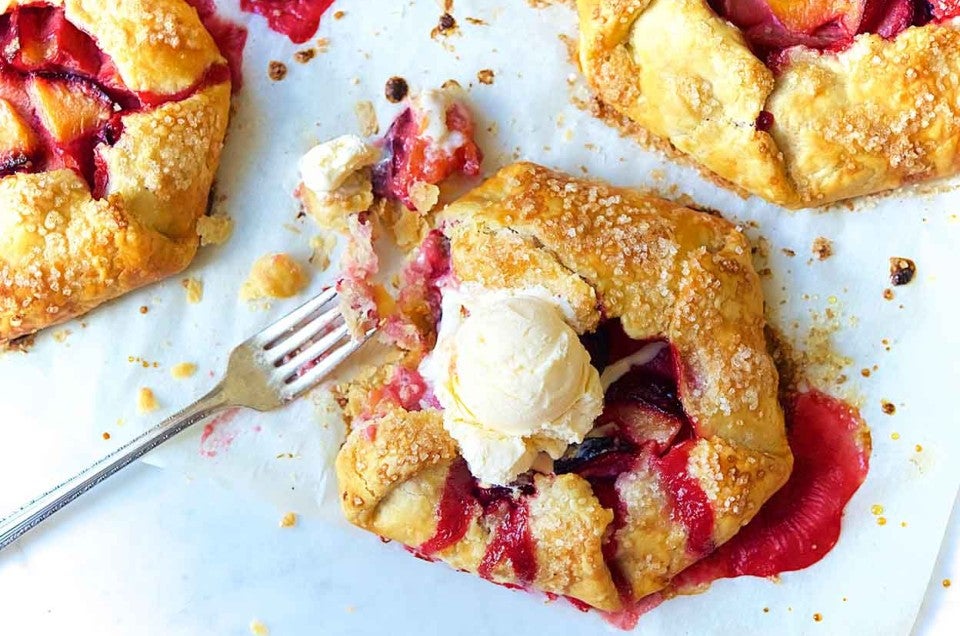When you don’t want to bake a pie, make these tarts instead
With a dose of sour cream, they’re a rich, creamy (and foolproof) fruit dessert.


I’m in the middle of writing an entire book about pie, and even I occasionally don’t want to bother making one.
There’s the mandatory crust chilling — 30 minutes at the minimum, a couple hours if you really want to ensure things turn out well.
Then the shaping — I like perfectly crimping my crust as much as the next baker, but there’s no denying it takes time, patience, and attention.
And finally, serving — I’ve cut countless pies in my life, and even still, I sometimes wind up with a wonky, wobbly slice that tastes amazing, but looks less than lovely when handed to friends to enjoy. Not to mention, serving a nice-looking fruit pie means waiting hours for it to fully cool before slicing — who can wait that long?
It’s a sentiment I suspect fellow bakers of all skills levels can relate to, and lucky for all of us, the King Arthur test kitchen anticipated these anxieties a long time ago when they developed what my fellow blogger PJ Hamel calls “a mishmash of all kinds of older recipes”: Rustic Fruit Tarts.
These little individual tarts are made on a baking sheet with a freeform, galette-style shape, one that cradles a sweet filling made mostly of diced fruit and sour cream. Like the best fruit pie recipes, this one can be made with a range of options depending on the season or simply your cravings: juicy stone fruits in the height of summer or tart apples in the cooler autumn months. It’s a refreshingly simple alternative to making an entire pie, but beyond just being a basic substitute, this recipe stands all on its own in at least four distinct ways.

Unlike a typical pie crust that calls for cutting in butter, stirring in ice water, and gently gathering into a disk sent to chill in the refrigerator, this recipe lives up to its name with a true tart crust, one made with creamed butter and sugar, plus egg yolks added for richness. The result is a soft, tender dough that doesn’t need to be chilled before shaping and handles easily when it comes time to roll and fold. Once baked, it’s delicate and crumbly, yielding easily beneath a fork to the filling within.

Instead of pressing into a pie or tart pan, the pastry is then rolled into flat circles, with the edges folded up and over the filling in the center. According to PJ, the rustic fold-up crust — reminiscent of a galette — was a technique offered in the original version of the King Arthur Baker's Companion from 2004. “I was trying to think of the easiest way to make a double-crust pie without rolling two crusts,” recalls PJ, “and this struck me as a solution. Obviously, I didn't invent this technique; but back when we debuted it, it wasn't that widely familiar.”
The delightfully simple technique can also be found in another longtime King Arthur recipe: Humble Pie.

Not to be outdone by the pastry that surrounds it, the fruit filling might be the real star of the show. Enhanced with a hearty helping of sour cream, it’s tart and creamy, and the sour cream adds both flavor and richness to complement the bright freshness of the fruit. I’ve found it helps make the filling more cohesive, something that’s often missing from galettes since they don’t bake long enough for the fruit to break down and stew into a soft, juicy, jam-like consistency.
“I'm quite sure the sour cream in the filling comes from my mom's very favorite pie of all time: Sour Cream Peach Pie,” says PJ. “It was the one pie she made without fail every summer — we both loved it.”
You can try taking these Rustic Fruit Tarts up a notch by adding a dash of rum to the sour cream filling, as PJ and her mother did in that original peach pie.

You could, of course, turn this recipe into one (or really, two) giant tart(s), but part of its joy is that each diner gets their own individual serving, perfectly round and ready to eat warm without having to struggle over messy slices. Now show me a pie that can do that.
Try baking these Rustic Fruit Tarts yourself and let us know what you think in the comments, below.
Cover photo by Liz Neily.

